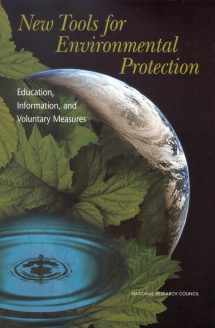
New Tools for Environmental Protection: Education, Information, and Voluntary Measures
Book details
Summary
Description
Many people believe that environmental regulation has passed a point of diminishing returns: the quick fixes have been achieved and the main sources of pollution are shifting from large "point sources" to more diffuse sources that are more difficult and expensive to regulate. The political climate has also changed in the United States since the 1970s in ways that provide impetus to seek alternatives to regulation.
This book examines the potential of some of these "new tools" that emphasize education, information, and voluntary measures. Contributors summarize what we know about the effectiveness of these tools, both individually and in combination with regulatory and economic policy instruments. They also extract practical lessons from this knowledge and consider what is needed to make these tools more effective.
The book will be of interest to environmental policy practitioners and to researchers and students concerned with applying social and behavioral sciences knowledge to improve environmental quality.
- Front Matter
- Part I: Introduction, 1. Exploring New Tools for Environmental Protection
- 2. Changes in Pollution and the Implications for Policy
- Part II: Information and Education for Individuals, Households, and Communities (Introduction)
- 3. Marketing Household Energy Conservation: The Message and the Reality
- 4. Knowledge, Information, and Household Recycling: Examining the Knoweldge-Deficit Model of Behavior Change
- 5. Promoting 'Green' Consumer Behavior with Eco-Labels
- 6. The Public Health Perspective for Communicating Environmental Issues
- 7. Understanding Individual and Social Characteristics in the Promotion of Household Disaster Preparedness
- 8. Lessons from Analogous Public Education Campaigns
- 9. Perspectives on Environmental Education in the United States
- 10. A Model of Community-Based Environmental Education
- 11. Community Environmental Policy Capacity and Effective Environmental Protection
- 12. Changing Behavior in Households and Communities: What Have We Learned?
- Part III: Voluntary Measures in the Private Sector (Introduction)
- 13. Government-Sponsored Voluntary Programs for Firms: An Initial Survey
- 14. Industry Codes of Practices: Emergence and Evolution
- 15. Harnessing the 'Power of Information': Environmental Right to Know as a Driver of Sound Environmental Policy
- 16. Challenges in Evaluating Voluntary Environmental Programs
- 17. Assessing the Credibility of Voluntary Codes: A Theoretical Framework
- 18. Factors in Firms and Industries Affecting the Outcomes of Voluntary Measures
- 19. The Policy Context for Flexible, Negotiated, and Voluntary Measures
- 20. Understanding Voluntary Measures
- Part IV: Conclusion, 21. New Tools for Environmental Protection: What We Know and Need to Know
- About the Contributors


We would LOVE it if you could help us and other readers by reviewing the book
Book review



